Publicaciones
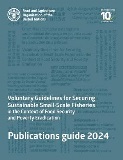
SSF Guidelines Publications guide 2024
2024
On the occasion of the 10th anniversary of the SSF Guidelines in 2024 this publication provides a summary overview of related global FAO guidance and information materials. It is not exhaustive and does not include region or country-specific materials.
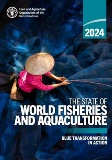
The State of World Fisheries and Aquaculture 2024
2024
The 2024 edition of The State of World Fisheries and Aquaculture features the Blue Transformation in action, illustrated by activities and initiatives, led by FAO in collaboration with Members, partners and key stakeholders, to integrate aquatic foods into global food security and sustainability, enhance policy advocacy, scientific research and capacity building, disseminate sustainable practices and technological innovations, and support community involvement.
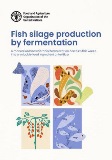
Fish silage production by fermentation
2024
This publication is a practical manual that will guide the reader through the main principles of producing fish silage by fermentation and explain each step of the fermentation process needed to successfully become a fish silage producer.
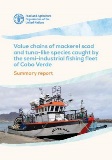
Value chains of mackerel scad and tuna-like species caught by the semi-industrial fishing fleet of Cabo Verde
2024
This report was developed under the Korean-funded “Sustainable Fish Value Chains for Small Island Developing States” project. It summarizes a much more detailed report focusing on the semi-industrial value chains of mackerel scad and tuna-like species in Cabo Verde.
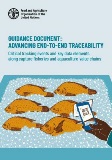
Guidance document: Advancing end-to-end traceability
2024
The Guidance document: “Advancing end-to-end traceability along capture fisheries and aquaculture value chains” responds to a critical need for consensus towards establishing end-to-end traceability through globally agreed and standardized understanding of the critical tracking events (CTEs) along the fish value chain, as well as sources of key data elements (KDEs) related to fish production and product identification.
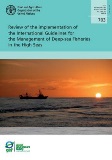
Review of the implementation of the International Guidelines for the Management of Deep-sea Fisheries in the High Seas
2024
This implementation review highlights the many advances that have been made in managing deep-sea bottom fisheries and protecting VMEs from adverse impacts caused by bottom fisheries. Such advances arise from an increasing awareness of the importance of protecting biodiversity and the need to ensure that fish stocks are sustainably harvested; they are the result of a complete change in the way bottom fisheries are managed.
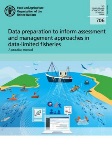
Data preparation to inform assessment and management approaches in data-limited fisheries
2024
In fisheries science and management, it is not uncommon that fishery data are used at “face value”, as inputs into data-limited assessments or empirical indicator-based frameworks for management, without first conducting a thorough exploration and critical review of the data. To address intermediate steps between data collection and any analysis used to inform stock status, this manual provides guidance on how to prepare, explore and critically review fishery data in data-limited situations.
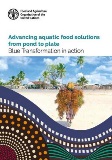
Advancing aquatic food solutions from pond to plate
2024
Sustainable aquaculture expansion is a major objective of FAO Blue Transformation. To release the potential of this sector, Africa’s aquaculture requires comprehensive development and business strategies, encompassing legislative and management frameworks, technological development, access to feeds and seeds, financial incentives, biosecurity controls, and innovative value chains tailored to national realities.

Diagnosis of aquaculture employment governance in selected African countries
2024
The objective of this research is to enhance understanding of the governance of aquaculture employment in ten African countries (Egypt, Ghana, Kenya, Malawi, Nigeria, Rwanda, Senegal, South Africa, Uganda and Zambia) and to determine their level of compliance with existing employment legislation in those countries.
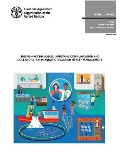
The Fish-Vet Dialogue: Improving communication and collaboration in aquatic organism health management
2024
The purpose of this Circular article is to inform national policymakers and other stakeholders of issues related to aquatic organism health and aquaculture biosecurity throughout the aquaculture supply and value chains, and to promote more effective collaboration between stakeholders to minimize risks of disease introduction, transmission, spread and associated production losses.
-fishing.tmb-th600x450.jpg?Culture=es&sfvrsn=86361453_6)
Checklists and technical guidelines to combat illegal, unreported and unregulated (IUU) fishing
2024
This document is the third volume of a series of publications entitled Checklists and Technical Guidelines to Combat Illegal, Unreported and Unregulated (IUU) Fishing. This checklist provides a list of minimum requirements to ensure that the national MCS systems, operations, procedures and tools aimed at combating IUU fishing are of the desired standard to achieve the objectives of the fisheries management framework in place.
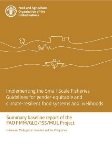
Implementing the Small-Scale Fisheries Guidelines for gender-equitable and climate-resilient food systems and livelihoods
2024
This report presents the design and results of a baseline survey with respect to a project of the Food and Agriculture Organization of the United Nations (FAO) focusing on empowering women in small-scale fisheries. The project supports the implementation of the Voluntary Guidelines for Securing Sustainable Small-Scale Fisheries in the Context of Food Security and Poverty Eradication (the SSF Guidelines).
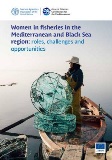
Women in fisheries in the Mediterranean and Black Sea region: roles, challenges and opportunities
2024
Recognizing the importance of taking the roles, needs and experiences of women into account when addressing social, economic and environmental issues related to the fishing sector, this study aims at narrowing research gaps in the region regarding gender and fisheries, as well as supporting the commitments of Mediterranean and Black Sea countries to promoting gender equality.

Fishery and Aquaculture Statistics – Yearbook 2021
2024
The FAO Yearbook of Fishery and Aquaculture Statistics, prepared by the Statistics Team of the FAO Fisheries and Aquaculture Division, offers a synthesis of the major trends in the fisheries and aquaculture sector.

GLOBEFISH Highlights. International markets for fisheries and aquaculture products – First issue 2024, with January–September2023 statistics
2024
GLOBEFISH Highlights is a globally recognized point of reference for information and analysis on international markets for fisheries and aquaculture products. The publication contains a detailed quarterly update on market trends for a variety of major commodities. Combining the price information collected for the European Price Report with other market survey data collected by FAO GLOBEFISH, the report provides a detailed update on market trends for a variety of major commodities.
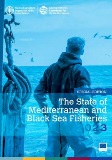
The State of Mediterranean and Black Sea Fisheries 2023
2023
This 2023 special edition of the GFCM’s flagship publication, The State of Mediterranean and Black Sea Fisheries, updates statistics and figures on the status and management of fisheries in the region and includes, for the first time, an overview of regional indicators on the aquaculture sector in Mediterranean and Black Sea countries.
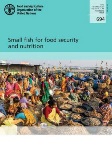
Small fish for food security and nutrition
2023
This technical paper brings focus to the often overlooked ‘small fish’ which play an integral role in the food security, nutrition and livelihoods of the small-scale fisherfolk who harvest, process, market, trade and distribute small fish to communities near and far from water bodies.
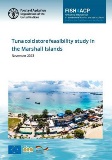
Tuna cold store feasibility study in the Marshall Islands
2023
This report presents the findings of a feasibility study for the potential development of a cold storage facility for tuna fisheries in the Marshall Islands (RMI). The study was conducted for the FISH4ACP programme, which supports opportunities to empower more inclusive and sustainable fisheries and aquaculture value chains in line with the 2030 Agenda for Sustainable Development.
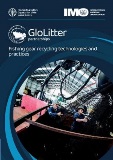
Fishing gear recycling technologies and practices
2023
This document is a report on the technical aspects and current examples of fishing gear recycling as an option for end-of-life fishing gear waste management and pollution control. The report also discusses fishing gear recycling options in the context of circular economy and Extended Producer Responsibility (EPR) principles.
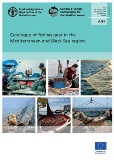
Catalogue of fishing gear in the Mediterranean and Black Sea region
2023
The wide variety of marine species of the Mediterranean and the Black Sea has led to the development of a highly diversified fishing sector characterized by a broad range of fishing gear. This catalogue aims to provide an overview and to describe the main technical characteristics and modes of use of fishing gear in operation in the region, considering specificities and differences not only at the regional level but also at the country and local levels.
